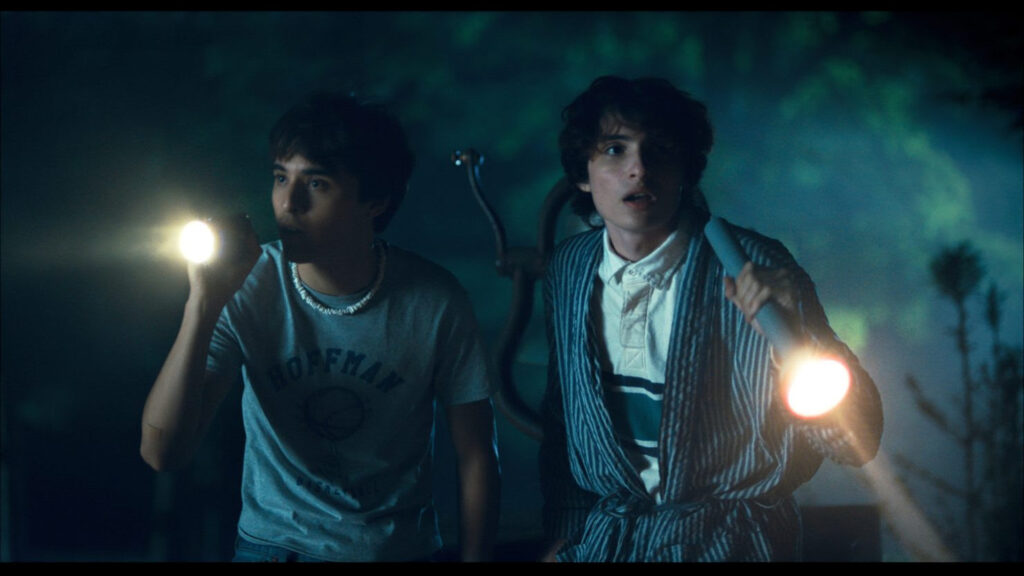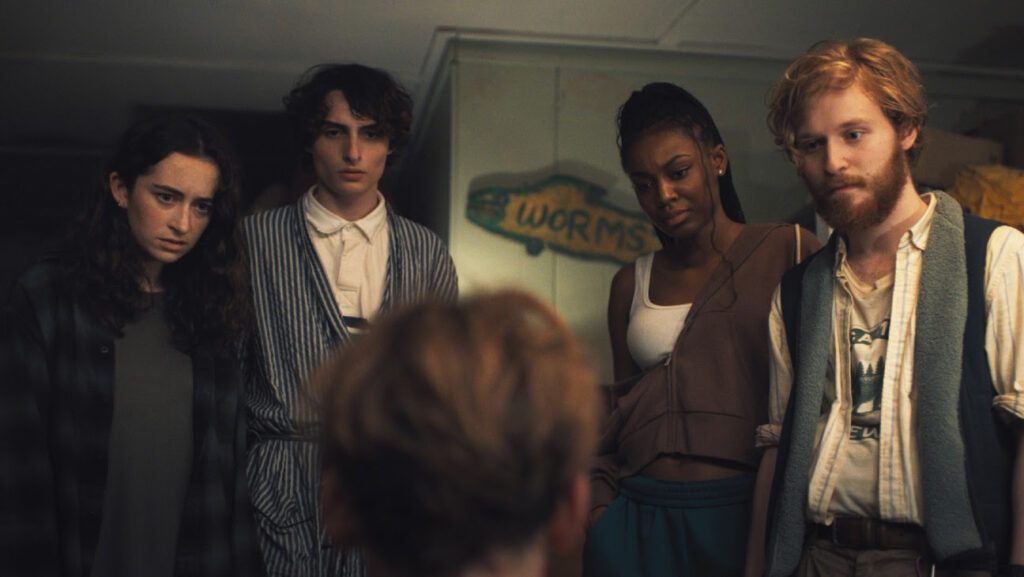Finn Wolfhard, Billy Bryk, and Fred Hechinger on Their Thrilling New Slasher “Hell of a Summer”

It doesn’t get much better than a summer camp slasher. Ever since watching Friday the 13th at a middle school slumber party, I’ve been obsessed with the oddly romantic blend of rustic beauty, campfire lore, ominous dread, and extravagant death that defines this particular brand of cinematic horror. While many have tried to recreate Sean S. Cunningham’s 1980 classic (including ten equally beloved F13 sequels and one brutal remake) the specific tone can be tough to nail down. Thankfully, this summer offers an exciting neo-slasher from a team of familiar faces. Finn Wolfhard and Billy Bryk write, direct, and star in the crowd-pleasing Hell of a Summer, a pitch-perfect update of the slasher format that strikes the perfect balance of humor and horror.
Jason (Fred Hechinger) is returning for an ill-advised sixth year as a counselor at Camp Pinewood, an idyllic summer program nestled in the picturesque woods. Despite his many seasons of service, Jason’s younger fellow counselors view the 24-year-old veteran as old and out of touch, questioning why he would keep returning to this adolescent job. But the self-appointed leader finds himself with newfound responsibility when Pinewood’s owners mysteriously vanish. Now tasked with overseeing the debaucherous Counselor Weekend, Jason must protect his disparate group of Gen Z misfits when a killer starts picking them off one by one.
Hell of a Summer recently premiered to a sold-out crowd at Nashville’s historic Belcourt Theater. Excited fans lined the block to enjoy pop-up camp festivities and welcome the filmmakers on this southern leg of a cross-country road trip. Wolfhard and Bryk introduced the film alongside producer and star Fred Hechinger. The trio then stayed for an exclusive Q&A after the final credits. Prior to the exciting premier, I sat down with this young team of creators to chat about iconic slashers moments, idealized summer camp experiences, and what it was like to direct their first film.
I love slashers, especially the summer camp slasher. Are you also fans, and what led you to create Hell of a Summer?
FW: I was a huge fan of horror films growing up, specifically those with practical effects and makeup. It was always something I was really interested in. When Billy and I met we had a shared love of comedy, but also this idea to meld the two.
BB: I had written a couple of horror comedy short films that Finn read and we did a little table read of them. It was going really well and we thought it would be a great thing for us to approach together. And we just wanted to hang out. [Laughs] We never really had a summer camp experience, any of us. We all had disappointing summer camp experiences and we all shared the same romantic idea of what summer camp could have been. There’s something so exciting about going to film a movie at camp, especially a slasher movie. So it was like a dream come true.
It does feel like a hangout movie at times. And really captures the fun of camp. Finn, you mentioned comedy. Hell of a Summer may be frightening, but it’s also really funny. How did you approach blending the mix of horror and humor?
BB: We always wanted it to feel like the comedy was coming from the characters and the horror was coming from the circumstance. And that one would sort of elevate the other. To me, the funniest moments of the film are built directly on the scariest moments of the film, when the stakes get higher. Oftentimes how people think they would react to situations is, you have a character, they have flaws or weird insecurities, and then something really awful happens. Then all of a sudden, all of your petty disagreements go away and your priorities are just to survive. Everything else just goes out the window.
In my experience, that wasn’t how I reacted in situations where something felt scary. I couldn’t help but still have the same worries that I had before. In fact, it amplified them. So what we wanted to do was set up who these people are and then when the killer starts picking people off, it just amplifies all their flaws. It leads to all these situations that I think are really, really funny. But nobody becomes a perfect hero. They all have to do it in their own way or become a coward in their own way.
It’s a really impressive script and directorial debut. And Fred, you produced the film! How did this collaboration come together and what was it like on set?
FH: Every day really was pretty dreamy. The collaboration felt really organic. We met and I think it was supposed to be for 45 minutes. And then suddenly it was four hours later. We realized that we had so many of the same influences. And it wasn’t just movies that we were talking about. We realized even YouTube videos that meant a lot to us growing up had shaped certain comedic DNA. So it was all just very organic.
And that’s how it was on set every day. We filmed this at an actual summer camp. It was the first summer that campers were coming back post COVID. They told us we might not be able to find a camp in June in the window that we needed to film. Billy looked on Google Maps and found a camp in Ontario that he had to actually drive out to see because they didn’t pick up the phone.
BB: Well, my dad drove because I don’t know how to drive. I was looking at all these fishing lodges and Airbnbs that maybe looked like camps for ways we could try and cheat it because it just seemed like there was no possibility of finding an actual camp. And then the day before my location scout, again, meaning me and my dad, the camp called and said, “Hey, we can squeeze you in if you want to come check this camp out.” I was thinking, “ah, it’s an hour and a half away from all the other camps. All I’ve seen of it is this painting. I don’t know what this camp looks like. Is this just a waste of time?” And my dad, to his credit, said “dude, we’re already out there. Like, let’s just go see it.” And the second I walked in, I thought, “Oh, this is perfect.” It was like the camp of our dreams. And it happened to be available for one month that whole summer—the exact month we needed to shoot. We were in and out in nineteen days, set up, cleaned out, scrubbed all the blood off the cabins. So the kids that were coming in the next week didn’t freak out [Laughs]. But it was such a blast. It was a crazy experience.

I would consider Hell of a Summer a meta-slasher. I imagine the name Jason is a nod to another famous camper. There are some other classic horror references, a supernatural element, and a murder mystery that feels at times like Gen Z’s answer to Clue. Was it fun playing around with these archetypes and tropes?
BB: Gen Z Clue is awesome.
FW: Gen Z Clue is probably my favorite description of the film so far.
FH TO FW: Your outfit in the film is totally Clue. The robe?
FW: Yeah, the robe! [Laughs] That was so much fun, messing with these tropes and teeing something up, maybe something that audiences are used to seeing in slashers, and then letting the air out of the balloon by doing the opposite.
BB: It’s tough with the meta angle, because obviously, since Scream almost every slasher film has an awareness of other slashers and film history. With the Jason thing, when the characters all turn on him, even if it’s subconscious, the fact that his name is Jason and they’re at a camp and there’s a killer, that was obviously intentional. But we tried to find the balance of maintaining a self-awareness that would feel realistic to these characters. We didn’t want it to feel like a parody or a satire or feel too winky. We wanted it to feel like these characters would be aware of these tropes, but keep it a pure slasher in many other ways. It was something we talked about a lot. It’s a dangerous game, the meta element. We never wanted it to feel like the characters knew they were in a movie. They could be aware of movies, but we never wanted it to feel like they were aware that this was a movie.
FH: Yeah, the characters know movies, but the movie doesn’t know it’s a movie.
Yes! I love that. You also mentioned effects. How did you handle the kills? That’s my favorite part of any slasher, which I’m always afraid makes me sound like a psycho. But, you know, we’re horror fans. [Laughs]
FW: I think that’s why I wanted to write a slasher, to see those kills. For us, it was a deliberate conversation we had throughout the whole process: what to show, what not to show. And as the movie progresses, the kills get gnarlier. We used that as a tool to add a bit of urgency and stakes to the structure of the movie. I don’t want to spoil anything, but we liked the idea of playing with timing. A lot of our conversations also had to do with showing too much too early on, because if you do, it’s hard to come back from the horror and return to the comedy. So we saved all the best kills for later in the film.
Please allow me to geek out for a second. I’m a huge Stephen King fan. I’ve read It at least five times. I also love Fear Street and Ghostbusters. Are there any other subgenres or horror realms that you want to tackle next?
BB: That’s a great question … for you guys. Yes. [Laughs]
FW: I think as far as genre, for me it’s always about the characters and the story. While I’m a sucker for fantasy, horror, and the supernatural, a lot of times it just comes down to the story and the script. But I’m definitely open to anything.
FH: Yeah, same. Something I love about horror movies is that I feel they’re best seen in a theatre with an audience. It’s just, being together in the dark in that way is a thrill that both makes the movie scarier and also more enjoyable. We’re really thrilled that Hell of a Summer is getting a theatrical release, a nationwide theatrical release. That means a lot to us.
Catch Hell of a Summer in theaters on April 4th!